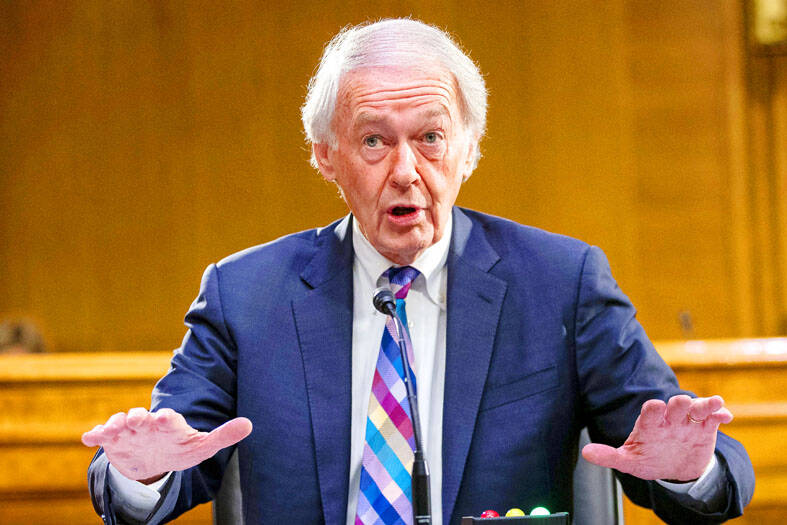US Senator Ed Markey on Thursday criticized China for destabilizing the Taiwan Strait and called on the US government to take actions that would put Taiwan in the strongest defensive position possible.
The US must take actions that have substantial benefits for Taiwan’s defense, and avoid measures that put Taiwan at risk, Markey said in a prerecorded video played at a seminar at the Center for Strategic and International Studies, a Washington think tank.
With China supporting Russia’s war in Ukraine and continuing to adopt aggressive policies toward Taiwan, it is not a simple challenge to deal with the Chinese threat, he said.

Photo: AP
Although the US and China are not locked in a new cold war, the US must still carefully observe China’s intentions, he said.
It should also demonstrate unity with allies and partners, and still cooperate with China when necessary, Markey said, adding that the US must avoid unnecessary provocations in dealing with China.
Communication channels must be open to avoid “fatal miscalculations,” he said.
The world must be made aware that it is China — not Taiwan or the US — that is trying to change the “status quo” in the Taiwan Strait, Markey said, citing Beijing’s overreaction to a visit to Taiwan by US House of Representatives Speaker Nancy Pelosi in August, despite similar visits having been made in the past.
To avoid China unilaterally changing the “status quo,” the US must ensure Taiwan is in the best position possible to defend itself and also make regional allies aware that the US is committed to Taiwan’s defense, but would do everything in its power to avoid a conflict, he said.
However, the US must also avoid actions that put Taiwan at risk without providing any substantial benefit, he said.
Markey said the proposed “Taiwan fellowship act,” which passed the US Senate in a bipartisan vote on June 8 last year, would enhance the connection between the people of both nations, and support Taiwan’s self-defense and security interests.
The purpose of the act, according to the US Congress Web site, is to strengthen the US-Taiwan strategic partnership through assigning US officials to spend time in Taiwan to learn Mandarin, and improve their knowledge of the politics, history and culture of Taiwan and the Indo-Pacific region.
The act also seeks “to better position the United States to advance its economic, security, and human rights interests and values in the Indo-Pacific region.”

CHAOS: Iranians took to the streets playing celebratory music after reports of Khamenei’s death on Saturday, while mourners also gathered in Tehran yesterday Iranian Supreme Leader Ayatollah Ali Khamenei was killed in a major attack on Iran launched by Israel and the US, throwing the future of the Islamic republic into doubt and raising the risk of regional instability. Iranian state television and the state-run IRNA news agency announced the 86-year-old’s death early yesterday. US President Donald Trump said it gave Iranians their “greatest chance” to “take back” their country. The announcements came after a joint US and Israeli aerial bombardment that targeted Iranian military and governmental sites. Trump said the “heavy and pinpoint bombing” would continue through the week or as long

TRUST: The KMT said it respected the US’ timing and considerations, and hoped it would continue to honor its commitments to helping Taiwan bolster its defenses and deterrence US President Donald Trump is delaying a multibillion-dollar arms sale to Taiwan to ensure his visit to Beijing is successful, a New York Times report said. The weapons sales package has stalled in the US Department of State, the report said, citing US officials it did not identify. The White House has told agencies not to push forward ahead of Trump’s meeting with Chinese President Xi Jinping (習近平), it said. The two last month held a phone call to discuss trade and geopolitical flashpoints ahead of the summit. Xi raised the Taiwan issue and urged the US to handle arms sales to

State-run CPC Corp, Taiwan (CPC, 台灣中油) yesterday said that it had confirmed on Saturday night with its liquefied natural gas (LNG) and crude oil suppliers that shipments are proceeding as scheduled and that domestic supplies remain unaffected. The CPC yesterday announced the gasoline and diesel prices will rise by NT$0.2 and NT$0.4 per liter, respectively, starting Monday, citing Middle East tensions and blizzards in the eastern United States. CPC also iterated it has been reducing the proportion of crude oil imports from the Middle East and diversifying its supply sources in the past few years in response to geopolitical risks, expanding

Pro-democracy media tycoon Jimmy Lai’s (黎智英) fraud conviction and prison sentence were yesterday overturned by a Hong Kong court, in a surprise legal decision that comes soon after Lai was jailed for 20 years on a separate national security charge. Judges Jeremy Poon (潘兆初), Anthea Pang (彭寶琴) and Derek Pang (彭偉昌) said in the judgement that they allowed the appeal from Lai, and another defendant in the case, to proceed, as a lower court judge had “erred.” “The Court of Appeal gave them leave to appeal against their conviction, allowed their appeals, quashed the convictions and set aside the sentences,” the judges